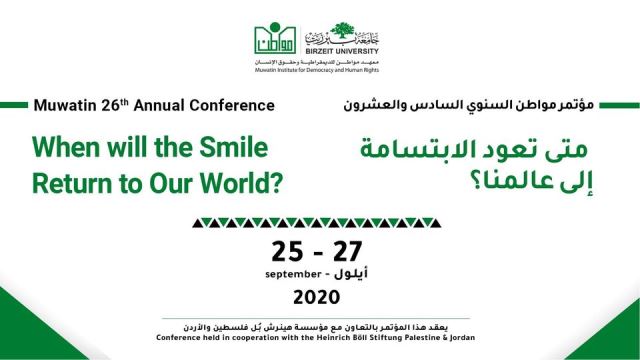Date/Time
Date(s) - 25/09/2020 - 27/09/2020
12:00 am
Categories No Categories

The 26th Annual Conference of Muwatin Institute for Democracy and Human Rights at Birzeit University, Palestine was held from 25th-27th September. This conference titled “When will the Smile Return to Our World?” explored the crisis in the current world order and how its impact will be balanced on global and Arab scales.
The pandemic unveiled the deception by the neoliberal promise of empowerment and self-realisation. It became known that the promised path to empowerment depended upon the enslavement of people with chains of debt, consumption, and the lack of security, in addition to a series of economic and political crises. It revealed that governments are capable of intervening and minimising democracy when they so desire. Keeping this context at the heart of the deliberations, international scholars came together to discuss the nature of the neoliberal era, the decline in the position and role of international institutions, wealth polarisation, the mechanisms of transformation in the global system and the shape of the future in terms of welfare, justice, wealth, work, education, health, and social security.
Dr. Rajesh Tandon, (Founder-President, PRIA & Co-chair, UNESCO Chair in Community-Based Research & Social Responsibility in Higher Education) delivered the Keynote Address on the issue of participatory democracy in post-pandemic era on the second day of the conference. He started his address with an altered title of a movie namely ‘Eyes Wide Open’, wherein he exposed the faults of the capitalist economic model of the west. The pandemic opened peoples’ eyes to the degree of ignorance attributed by governments to the public health infrastructure available to the common man. Many countries in South and South-East Asia saw migrant workers losing their livelihoods during Covid-19. In India, 20 million migrants were uprooted overnight, as their employers refused to give their wages, their landlords asked them to leave if they could not pay rent and transport facilities halted. These informal migrant workers had been all around us for decades but went unnoticed for their contributions. Covid-19 showed humanity the mirror by showing us how small local practices could help us better reconnect with our ecology, families and support systems. It made people realise how they can move towards a more balanced way of relating with their ecosystem. Local wisdom and cultures played a huge role in supporting local communities, which reinstilled peoples’ faith in local leadership even in the face of a global disaster. Community support was critical in reducing stress, and those who were stuck at home alone faced mental trauma of great magnitudes. Dr. Tandon also shared another benefit of the pandemic, namely the ‘returning to austerity’ approach. People’s lives altered dramatically in many ways, an important component of which was to reduce the excesses of lifestyles that people had endured all this while. People were forced to relish home cooked food instead of ordering food from outside; cutting down on unnecessary expenditures and leading simpler lives.
In light of Covid-19, many aspects of peoples lives shifted to the digital world. However the effects of over-emphasis on technology have problematic outcomes. Reflecting on these challenges, Dr. Tandon emphasised that the digital world can never displace the critical role played by human connections. Technology has falsely glorified the ‘all-purpose’ function it plays to the extent that people are losing the ability to analyse problems without the help of technology. This fiction is corrupting the education system, where people are over-dependant on technologies to find answers to everything in life. Social media has further reinforced parochial values, by creating a false consciousness based on fragmenting society into different categories based on regions, religions and communities.
One of the ways to bring the smiles back in this new normal is by refocusing on horizontal citizenship which is based on community solidarity. Electoral democracy does not work for every citizen; the State has misused its power to segregate society, give false identities to people and discriminate against those who do not adhere to its ideology. The idea of ‘economies of scales’ must be abandoned and the idea of ‘small is beautiful’ must be highlighted. Devolved governance is the only way forward and a participatory approach must be at the heart of it. Different knowledge cultures must be appreciated instead of encouraging one dominant knowledge system to prevail over others. Knowledge systems of indigenous communities, women, different castes, different religions must be emphasised and to understand them, understanding different language cultures is crucial. By killing those knowledge systems, we are killing diversity of knowledge democracy.
To learn more about the event, watch the recording on the following link:




